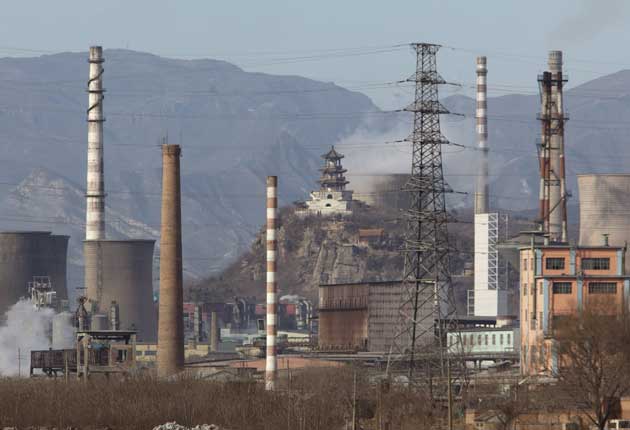United on climate change: Obama's Chinese revolution
US President wants the world's two biggest polluters to form a partnership in the battle against global warming. Geoffrey Lean reports

Your support helps us to tell the story
From reproductive rights to climate change to Big Tech, The Independent is on the ground when the story is developing. Whether it's investigating the financials of Elon Musk's pro-Trump PAC or producing our latest documentary, 'The A Word', which shines a light on the American women fighting for reproductive rights, we know how important it is to parse out the facts from the messaging.
At such a critical moment in US history, we need reporters on the ground. Your donation allows us to keep sending journalists to speak to both sides of the story.
The Independent is trusted by Americans across the entire political spectrum. And unlike many other quality news outlets, we choose not to lock Americans out of our reporting and analysis with paywalls. We believe quality journalism should be available to everyone, paid for by those who can afford it.
Your support makes all the difference.Barack Obama is to invite China to join the United States in an effort by the world's two biggest polluters to stop global warming running out of control.
Hillary Clinton, his Secretary of State, is to raise the prospect of a "strong, constructive partnership" to combat climate change on a visit to Beijing next week, and the President is seriously considering a proposal from many of his most senior advisers to hold a summit with the Chinese leadership to launch the plan.
Last week, China's ambassador to the US, Zhou Wenzhong, made it clear that his government would welcome "co-operation on energy and climate change" with the US. Such unprecedented teamwork would transform the world's prospects for agreeing radical measures to combat global warming, and – senior Obama administration officials believe – lay the foundation of a new relationship between the two most powerful countries in the world.
For years, progress towards negotiating a new international climate change treaty has been bedevilled by the two superpowers, each refusing to commit itself to action unless the other goes first, and mutual suspicion has been growing. Between them, the US and China produce over 40 per cent of the world's emissions of carbon dioxide. About two years ago, China overtook the world's largest economy as the planet's biggest polluter. But Americans still emit more than four times as much of the gas per person as their Chinese counterparts.
Neither country has to reduce its emissions under the Kyoto Protocol. China, like other developing countries, is excused the reduction targets placed on industrialised nations. Former president George Bush rejected the treaty partly because of China's exemption.
The stand-off has dogged negotiations on a new, much tougher treaty as the US has been unwilling to agree to any targets until China commits itself to act on its emissions. China, for its part, has insisted the US act first as it has made a far greater contribution to the crisis, spewing out more than three times as much carbon dioxide over the past two centuries.
The arrival of President Obama – and increasing concern about climate change within the Chinese leadership – has provided an unprecedented opportunity to break the deadlock.
Both the President and Mrs Clinton have made it clear that combating climate change is among their highest priorities, and top Chinese officials are now indicating that their government is ready to work with them. Both countries have included "Green New Deal" measures, amounting to scores of billions of dollars, in their stimulus packages.
Mrs Clinton will visit Beijing for two days on 20 February, on her first overseas tour as Secretary of State, with the climate and financial crises at the top of her agenda.
Todd Stern, her special envoy for climate change, said last week; "Secretary Clinton is keenly aware that the United States, as the largest historic emitter of greenhouse gases, and China, as the largest emitter going forward, need to develop a strong, constructive partnership to build the kind of clean energy economies that will allow us to put the brakes on global climate change. We need to put finger-pointing aside and focus on how our two leading nations can work together productively to solve the problem."
The Chinese ambassador to the US sounded much the same note and appealed to American commercial self-interest in helping his country tackle global warming. "Co-operation between our two countries on energy and environmental issues will enable China to respond to energy and climate change issues more effectively, while at the same time offering enormous business opportunities and considerable return to American investors," he said.
He was speaking at the Brookings Institution launch of one of two important reports on the prospects of a US-China partnership on climate and clean energy – published on Thursday by experts with enormous influence in the new White House – which both called on Mr Obama to hold a summit with the Chinese leadership on the issue.
The Brookings report is written by two of its fellows, David Sandalow and Professor Kenneth Lieberthal, who both worked in the Clinton White House and have been tipped for senior posts in the new administration.
The second report, published by the Asia Society and the Pew Foundation, has an even more impressive pedigree. It was produced by a committee chaired by Steven Chu, the new US Energy Secretary, and John Thornton, tipped as the new ambassador to China, and carries a forward by Richard Holbrooke, appointed as the President's special envoy to Afghanistan and Pakistan. It has contributions from Mr Stern and Professor John Holdren, President Obama's science adviser.
Join our commenting forum
Join thought-provoking conversations, follow other Independent readers and see their replies
Comments